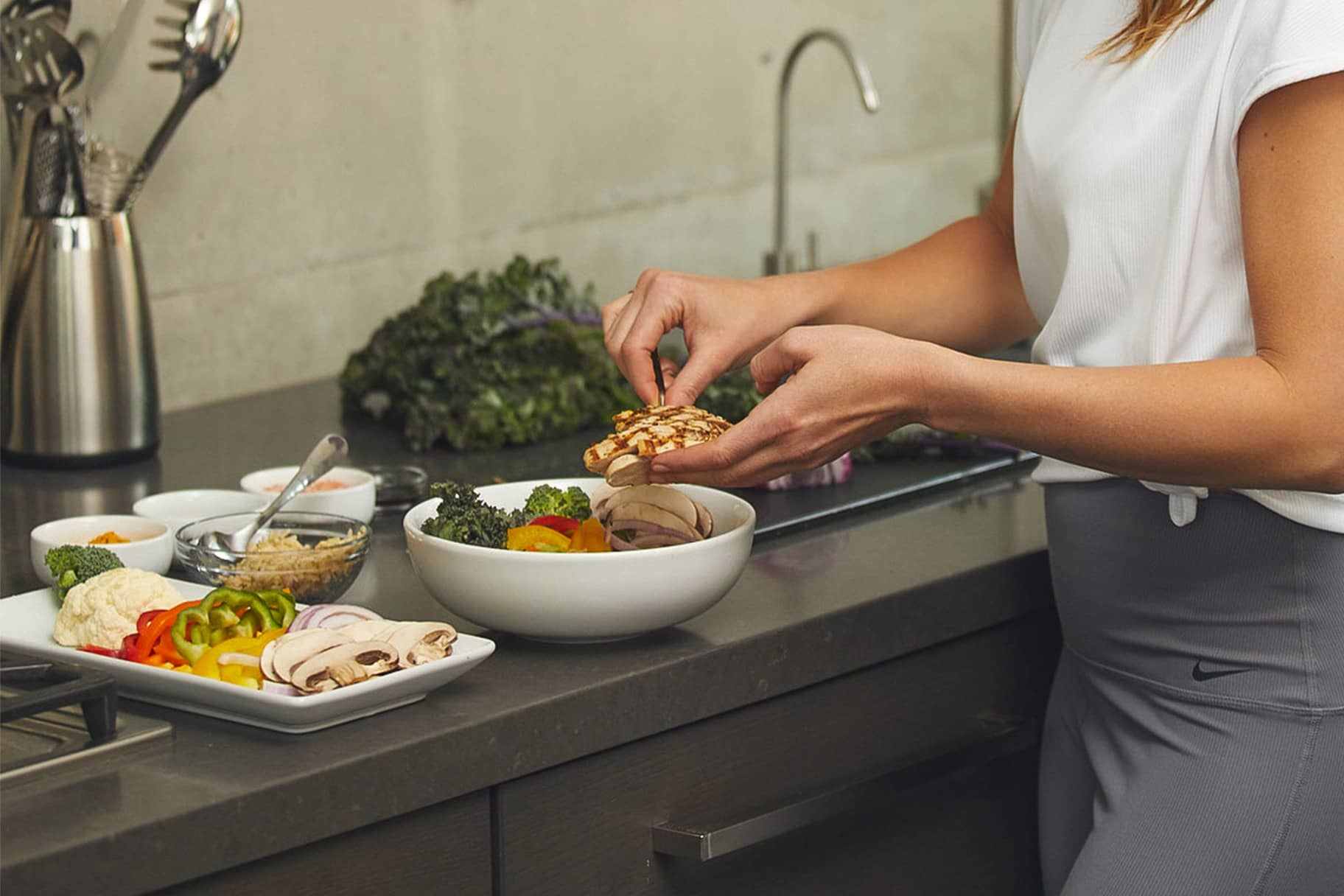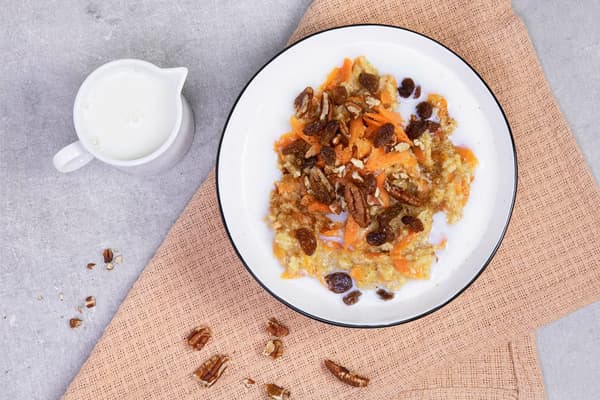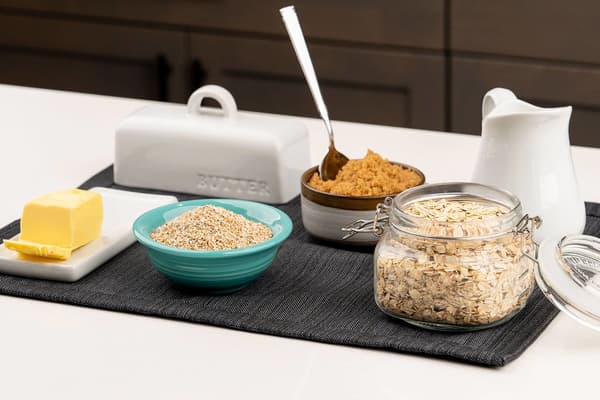Is Runner's Diet a Thing? Here's What the Experts Say
Nutrition
Experts say these are the top foods to fuel your performance.

Whether you're a novice runner or a seasoned marathoner, your nutrition (along with other factors like sleep and mindset) can determine your energy levels—and have a big effect on your performance.
"On average, a one-mile run equals 100 calories burnt, approximately, so if you run three miles, you burn about 300 calories", said Leslie Bonci, MPH, CSSD, a sports-registered dietitian for the Kansas City Chiefs and Carnegie Mellon University athletics. "That does not necessarily translate to having to significantly bump up calorie intake, but for runners running 50-plus miles per week, yes, calorie needs are higher".
Everybody is different. And therefore, diets are incredibly individual. That said, runners, in general, should focus on including key macronutrients and micronutrients when it comes to sculpting their personal running diet.
"In order to optimise strength, speed, stamina and recovery, you need more than time, talent and your running shoes", Bonci said. "There is not one food or one macronutrient that can provide everything a runner needs, which is why food combinations, with a variety on the plate [or] in the bowl or the glass allow for nutrient amplification and performance optimisation".

Macronutrients
The below macronutrient percentages apply to most runners. Those runners that log upwards of 50 miles per week may increase their caloric intake but should still fit the macro percentages below.
1.Carbohydrates
"Carbohydrate-containing foods provide 50 percent of the energy for moderate-intensity runs and almost all of the energy for high-intensity workouts", Bonci said. This is largely because carbohydrates (carbs) can be stored in the form of glycogen in both the muscles and liver, which can then be used during exercise. In other words, carbs should make up 45 to 65 percent of a runner's daily calories, Bonci said.
2.Fat
Fat provides the other 50 percent of the energy for moderate-intensity runs (running at 50 to 70 percent of your maximum heart rate), Bonci said.
"Fat is a fuel source for longer-duration, lower-intensity runs as fatty acids can be broken down and converted to energy", she said. "Fats should, generally, make up 20 to 30 percent of a runner's [daily] calories".
3.Protein
Protein can make up 20 to 25 percent of a runner's calories, Bonci said. Protein may not be the desired fuel source for runs because of how long it takes to break down, Bonci said, but the macronutrient does play a pivotal role in muscle repair and growth.
"This macronutrient is essential in the growth and repair of all body tissues, including muscle and bone, hormone and enzyme production, and optimal immune function", said Melanie Sulaver, MS, RD, CDN, CISSN, and nutrition coach based in New York City. "It's called muscle protein synthesis, where we want to maintain muscle as we rack up the miles and being consistent and deliberate with your protein intake is what helps make that happen".
(Related: What Is Protein Powder? And Should I Try It?)
Micronutrients
1.Iron
The main responsibility of iron is to help red blood cells transport oxygen around the body. But this micronutrient also plays a key role in energy production.
"Female runners are more likely to have low iron levels because of blood loss during menstruation but it can affect all runners as stores are depleted because of increased breakdown of red blood cells during endurance activity", Sulaver said.
Including iron in your diet can help you maintain energy levels throughout the entirety of your workout.
(Related: So, What Is Sweat, Anyway?)
2.Calcium
Consuming adequate calcium is required to maintain (and improve) bone mineral density. It's also essential for muscle contraction, blood clotting and nerve transmission, Sulaver explained. Dairy products and leafy greens are good sources of this micronutrient.
3.Vitamin D
If you're running outside during the day, you're probably getting some vitamin D, thanks to the sun. But it's also important to try to supplement this vitamin in your diet as well, though that can be a challenge seeing as the foods that naturally contain the vitamin are limited. Some sources include milk, salmon and eggs. Several breakfast cereals and orange juices are also fortified with the vitamin as well.
"Vitamin D is essential for bone health as it regulates the amount of calcium and phosphate in the body", Sulaver said.
Consider speaking to a GP or a registered dietitian to see if a supplement would be supportive for you.
4.Magnesium
Magnesium, another micronutrient that's important for bone health, also plays a role in nerve and muscle function, electrolyte balance, blood sugar and metabolism, Sulaver explained. "It can boost performance and has anti-inflammatory benefits, too", she said.

Hydrate With Water and Electrolytes
If your weekly mileage is reaching the double digits, you need to be consuming lots of water and electrolytes to both help fuel your runs and to help replenish your body post-run.
"Water prevents dehydration, it helps cool the body and acts as a transport medium", Sulaver explained. "It's stored in the body but in limited amounts, so we need to make sure we're replenishing it and electrolytes regularly".
(Related: This Is Exactly How Much Water You Should Drink Every Day, According to Experts)
5 Foods To Include in a Runner's Diet
"Bear in mind that the best foods, besides those below, are really ones that a runner knows [they will be able] to tolerate digestively and that don't cause any GI distress", Bonci said. And even more important: food is meant to be enjoyed, so it's key to choose foods you actually like as fuel.
1.Eggs
Eggs are an easy (and rich) source of protein.
"They're a small food, so they don't take up a lot of real estate in the gut and they're easily digestible", Bonci said. "Eat them as a pre-run meal on a muffin or a tortilla, or as part of a post-run replete, such as an omelette or vegetable quiche". Because they're light, eggs are also a good choice the night before a race, too.
(Related: What To Eat Before You Run a Race, According to Experts)
2.Porridge
Dish it up however you like, whether that's plain with berries or drizzled with a teaspoon or two of honey or 100 percent pure maple syrup. Porridge is a great source of carbs and offers a substantial amount of fibre too. Whole oats (not instant porridge) also have a lower glycaemic index than other carb-rich foods, which means they don't cause your blood glucose levels to spike rapidly.
"Porridge allows your blood sugar levels to rise slowly, providing you with extended energy over a longer period of time and also keeping you fuller longer", Sulaver said, adding that the food makes for a great breakfast before a long run.
3.Tart Cherry Juice
Drinking tart cherry juice after a tough run or workout can help with your recovery or drink it before bed after a long day for better sleep.
"Tart cherries contain melatonin and a high concentration of anthocyanin, which is a flavonoid that has similar anti-inflammatory properties to anti-inflammatory drugs (NSAIDs), like ibuprofen", Sulaver said. "If you're going to drink it before bed, have about 225 grams 30 to 60 minutes before you plan to close your eyes".
4.Salmon
Fish is a major—and complete—source of protein, a macronutrient that can help you feel more satisfied between meals. Not to mention, it's a great source of omega-3 fatty acids.
"These essential fats can help reduce inflammation after a run, which can ultimately improve tissue repair and reduce muscle pain", Sulaver said.
Bake, grill or cook a fillet of salmon over a bed of rice and veg for a perfect recovery dinner.
5.Rice or Quinoa
Not only are these two foods an excellent source of complex carbohydrates but they're also easy to prepare. Consider making a batch in bulk and including them in your meals throughout the whole week. They're also versatile, often found in hot bowls, salads or as a side. Bonci also recommended adding quinoa to hot cereal or porridge or as a side dish.
"Just like [for] any other carb and food [that] is eaten before runs, volume is key and smaller amounts—think tennis-ball sized—tend to be more gut-friendly", Bonci said. "For the post-run meals, a grain or starchy carb should be about one-third of the plate".
The Bottom Line
While there is no one specific diet all runners should follow, experts agree that the emphasis should be on the quality of the calories, like including a variety of macronutrients and micronutrients in your diet.
"The most important thing for a runner and any athlete or active individual for that matter, is meeting total energy needs to fuel their baselines, plus their training", Sulaver said.
Words by Amy Schlinger, NASM-CPT





